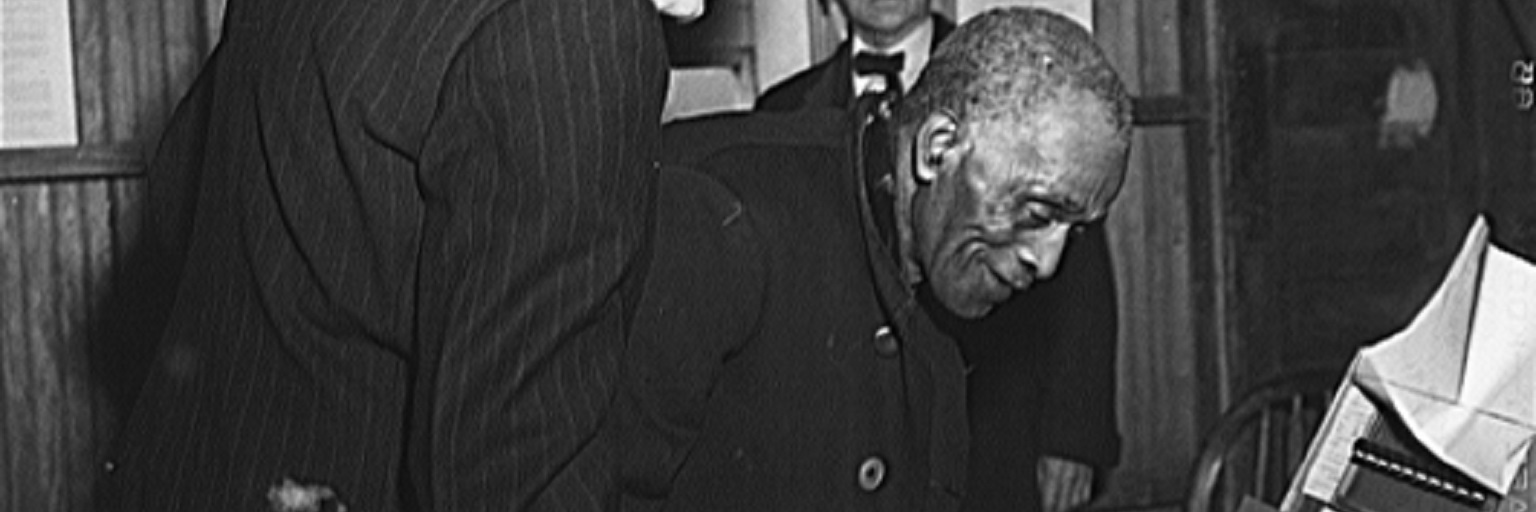Voting Rights Activism & Freedom Summer
During and after Reconstruction, African Americans faced disenfranchisement and voter suppression through violence, intimidation, and restrictions on registering, including literacy tests, in states throughout the South. Activism and organizing, as well as legal challenges, to protest disenfranchisement and voter suppression have never ceased. During the Civil Rights Movement in the 1960s, civil rights activists, including members of the Student Nonviolent Coordinating Committee (SNCC) organized voter registration campaigns in the South and, in 1964, under the Council of Federated Organizations, SNCC and members of the Congress on Racial Equality (CORE) worked with volunteering on a voter registration drive in Mississippi referred to as “Freedom Summer” or the “Mississippi Summer Project.” The Project focused on voter registration of African Americans and education of African Americans and also raised public consciousness of the racial violence and resistance to civil rights and voting rights when three civil rights activists were murdered: James Chaney, Andrew Goodman, and Michael Schwerner. The Mississippi Freedom Democratic Party (MFDP) and activist Fannie Lou Hamer’s testimony at the Democratic National Convention detailing her harrowing experiences living in Mississippi and the violence, intimidation, and retaliation she experienced when trying to register to vote, also raised public consciousness and political pressure to pass voting rights legislation, as did the violence and bloodshed during the Selma-to-Montgomery march in 1965.
Voting Rights Act of 1965 & its Legacy
Signed into law on August 6, 1965, the Voting Rights Act represented the culmination of Civil Rights organizing to protect suffrage and eliminate discrimination and disenfranchisement. It outlawed literacy tests and provided for federal oversight of registration and voting in some southern states and for preclearance of election laws or changes to them in jurisdictions that had a history of voter discrimination. The Voting Rights Act had an immediate impact increasing African American voter registration in the South, and since 1965, the Act has been extended and expanded. Yet, in Shelby County v. Holder (2013), the Supreme Court struck down a section of the Act as unconstitutional and violating the power of the states to implement and control elections. The Court held the section was outdated and not responsive to current conditions. The decision had an immediate effect and led to states implementing strict photo ID laws and voter roll purges.
South Carolina v. Katzenbach (1966)
The Supreme Court upheld the constitutionality of the Voting Rights Act of 1965 under the enforcement provision of the 15th Amendment. Learn More
Shelby County v. Holder (2013)
The Supreme Court struck down a section of the Voting Rights Act as unconstitutional and violating the power of the states to implement and control elections. The section was outdated and not responsive to current conditions. Learn More
- Post-Civil War Era (1865-1900): 11.4 (a)
- Social and Economic Change/Domestic Issues (1945-Present): 11.10 (a)
- Foundations of American Democracy: 12.G1 (e), 12.G1 (f)
- Civil Rights and Civil Liberties: 12.G2 (a), 12.G2 (d)
- Rights, Responsibilities, and Duties of Citizenship: 12.G3 (a), 12.G3 (b)
- Political and Civic Participation: 12.G4 (c), 12.G4 (d), 12.G4 (e)
- Bruce Watson, Freedom Summer: The Savage Season of 1964 that Made Mississippi Burn and Made America a Democracy (2010)
- “On this day, the Voting Rights Act of 1965 is signed,” from Constitution Daily Blog, posted by the National Constitution Center
- “Black Americans and the Vote,” posted by the National Archives
“Black Americans and the Vote,” posted by the National Archives
“What Was ‘Freedom Summer’?” includes video, materials, and discussion questions from American Experience, posted by PBS LearningMedia
“Securing the Right to Vote: The Selma-to-Montgomery Story,” by Martha Bouyer, under History Resources, posted by the Gilder Lehrman Institute of American History
“To Vote or Not to Vote,” includes videos, materials, and discussion questions, from Daily News Lessons, posted by PBS Newshour Classroom

